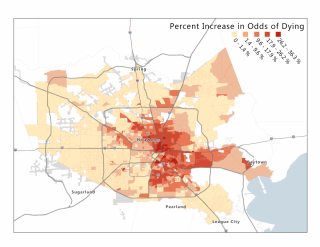
Climate and Weather Impacts on Human Health
Modeling the Impact of Climate on Infectious Disease Transmission and Human Health

Climate and Weather Impacts on Human Health
Modeling the Impact of Climate on Infectious Disease Transmission and Human Health

Human Health
Scientists at the National Center for Atmospheric Research (NCAR) are investigating the complex interactions among meteorological, ecological, social and behavioral processes in order to reduce the impacts of weather variability and climate change on human health. This research is performed with collaborators from U.S. and international universities and agencies, and has the following objectives:
- To understand the complex relationships among weather, climate and human health.
- To determine societal vulnerabilities and appropriate responses and adaptations to weather-and-climate-related threats to human health.
- To provide the state-of-the-art weather, climate, and air quality information in support of public health decision-making.
- To mentor the next generation of researchers in these interdisciplinary areas.
Components

The NCAR Weather, Climate and Health Program has research experience in the United States, including Colorado as well as internationally. Embedded withinNCAR’s Research Applications Laboratory, the program comprises climate, social, and health scientists with research expertise in environmental health (i.e., extreme heat and air quality), vector-borne diseases, GIS, community science, and health systems’ operational preparedness. Current research includes:
- Investigating population vulnerabilities to weather hazards and climate change through integrating atmospheric, social, and health sciences.
- Developing interdisciplinary research frameworks, spatial methods, usable datasets, and decision support tools for planning, policy, public health interventions, and risk communication.
- Evaluating the independent and combined impacts of indoor and outdoor extreme heat and poor air quality on the health of vulnerable populations.
-
Assessing the potential for vector-borne diseases (e.g., Zika, West Nile) to expand in the Americas under a variety of climate-and-societal change scenarios.
- Working with health systems in East, Southern and West Africa to enhance collaboration and joint operational capacities of national hydro-meteorological services and health departments to prepare for new and emerging health threats from increased climate variability and change.
- Developing a transferable process for adoption and sustainability of community-based interventions across multiple sites.
- Mentoring early-career scientists and students in interdisciplinary research methods in climate and health sciences and GIS decision-support systems.
Significant Projects
- Understanding climatic and societal factors affect on the abundance of the mosquito Aedes (Ae.) aegypti, and how mosquito abundance translates into Dengue Risk.
- Developing a prototype Earth-gauging system that integrates weather and health data to manage Meningitis in the African Sahel.
- Mapping and modeling Plague in Uganda to improve health outcomes.
Partners
- CDC Climate and Health Program
- Environmental Protection Agency
- NASA
- The National Institutes of Health
- National Science Foundation
Contact
Scott Swerdlin
Director, Weather Intelligence and Security Program